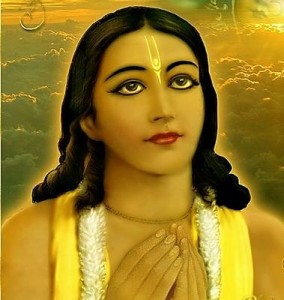The Fourth offense
– shruti-shâstra-nindanam –
This refers to blaspheming the Vedas and scriptures following the Vedas. ‘Blaspheming’ includes disregard, irreverence or any other adverse behavior. The Vedas are transcendental and self-manifested. “Vedayatiti vedah” -“Veda is one who makes himself known”. The Itihâsas, Purânas etc. elaborate the instructions of the Vedas. Srimad-Bhâgavatam is in accordance with the Vedas. Criticizing and disrespecting these scriptures is an offense.
The Vedas have three parts (called ‘kânda‘ or ‘trunks’). They are karma-kânda, gyân-kânda and upâsanâ-kânda. Naturally a devotee will not criticize the shrutis that extol devotion; however if a devotee thinks that those parts of the Vedas that instruct about karma and gyân are nonsense and because they do not directly deal with devotion, we can disrespect them – then he is committing an offense. We should realize that the Vedas are most compassionate. Not everybody is qualified for bhakti. There are people who are promiscuous and deeply attached to material enjoyments. The Vedas are resolved to enlighten even such fallen ones. The merciful Vedas instruct them in such a way that when these people follow the Vedic injunctions, someday they too will enter the temple of Bhakti devi. This is the root intention of those portions of the Vedas that preach karma and gyân. Thus when we know the truth about the scriptures, we will not commit the offense of criticizing them.
The Fifth Offense – tatha-artha-vâdo –
We see that the scriptures highly extol Sri Harinâm. The glory of the Holy Name is incomparable. When we think that these are mere eulogies, and are not true, we commit offense.
To tell you the truth, the magnificence of the Holy Name is like a fathomless ocean. It has no limits. How much of its glory have the scripture and preceptors been able to express?
They must have revealed only a drop of this ocean. Yet, if we think that it is merely ‘glory’ and not true – can we guess how much offense we are committing?
Why do the Vedas sing false glory? |
Here we may question -we find that the Vedas extol even devatâ-pujâ, sacrifices etc. and state that the joy in the heavenly planets never comes to an end, it is limitless and we should make it our supreme goal. Are they not exaggeration? When we, the devotees, boldly proclaim that these statements are not true, yet do not commit offense while saying so, then why do we offend the Holy Name when we think its glory too as false? The answer is that – the Vedas want to draw unfeeling lusty people who are highly attached to material comforts than to a spiritual life. So they eulogize heavenly-joy. By these statements the Vedas want to tempt these people and improve the quality of their lives. On the other hand, Sri Bhagavân is absolute, the One and only the Supreme Object. His Holy Name, bhakti and prem are so inconceivably great that even the Vedas fail to grasp them. They are beyond the Vedas. Hence there is no question of singing false glory.
“Sri Krishna is Truth and Sri Krishna-bhakti is love personified. Sri Krishna, His bhakti and the chanting of His Holy name are all blissful.” – (C.C.Âdi.1.9.6)
(to be continued)


2 thoughts on “Chapter 8 :Why should we not criticise the Vedas alhtough they glorify karma and gyan?”